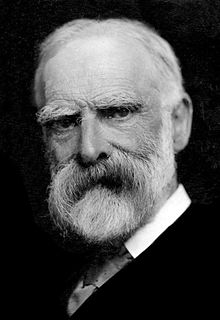James Bryce, 1st Viscount Bryce, OM, GCVO, PC, FRS, FBA (10 May 1838 – 22 January 1922), was a British academic, jurist, historian, and Liberal politician. According to Keoth Robbins, he was a widely traveled authority on law, government, and history whose expertise led to high political offices culminating with his successful role as ambassador to the United States, 1907–13. In that era, he represented the interests of the vast British Empire to the United States. His intellectual influence was greatest in The American Commonwealth (1888), an in-depth study of American politics that shaped the understanding of America in Britain and in the United States as well.[1]
- ^ Keith Robbins, "History and politics: the career of James Bryce." Journal of Contemporary History 7.3 (1972): 37–52.
